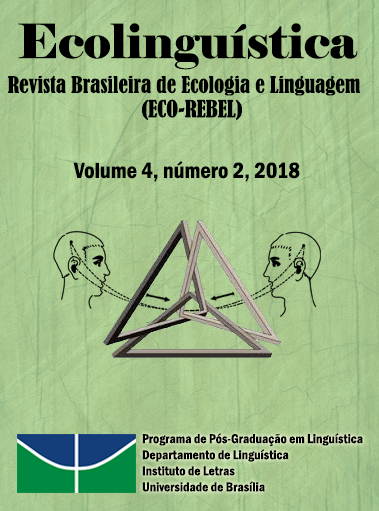When grasshopper means lightning
how ecological knowledge is encoded in endangered languages
Keywords:
Diversidade biocultural; línguas ameaçadas; léxico mental; narrativa; conhecimento ecológico tradicional.Abstract
: In response to world-wide extinction of both indigenous languages and endemic species, an international, interdisciplinary movement has arisen with the goal of conserving biocultural diversity. The fundamental insight of biocultural conservation initiatives is that established correlations between cultural diversity and biodiversity (and endangerment) may point to solutions to the present crisis. This paper highlights one understudied aspect of this endeavor ”“ how ecological knowledge is encoded in endangered languages ”“ before considering how linguists may contribute to this growing community of practice. The most obvious linguistic encoding of traditional ecological knowledge is in the mental lexicon: words that refer to objects, events, and states in the natural world, as shown in examples drawn from languages such as Kayapó, Piaroa, and Minangkabau. Equally important for the linguistic transmission of ecological knowledge are the narratives found in stories, myths and ceremonial recitation, as exemplified by Chehalis, Wayampi, and Bininj Gunwok. Linguists who join this interdisciplinary struggle for environmental conservation and social justice may contribute not only through primary fieldwork, linguistic analysis, or expertise in multilingual education programs, but also by raising consciousness of the beauty and value of biocultural diversity through social outreach.
Downloads
Downloads
Published
How to Cite
Issue
Section
License
Authors who publish in this journal agree to the following terms:
Authors retain copyright and grant the journal the right of first publication. The work is simultaneously licensed under the Creative Commons Attribution License allowing the sharing of the work with acknowledgment of the authorship of the work and initial publication in this journal.
Authors are authorized to enter into additional contracts separately for non-exclusive distribution of the version of the work published in this journal (e.g., publishing in institutional repositories or as book chapters), with acknowledgment of authorship and initial publication in this journal.
Authors are allowed and encouraged to post and distribute their work online (e.g., in institutional repositories or on their personal page) at any point before or during the editorial process, as this can bring about productive revisions as well as increase impact.
Citation of published works (See The Effect of Free Access).



3.png)



